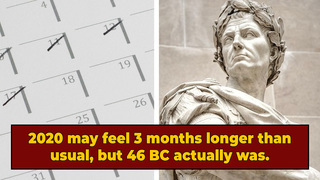The Year That We Had 15 Months

It's hard to believe that, with how excruciatingly long 2020 is feeling, that we're still only in July. Wait, it's October? I should probably change my underwear. Still, imagine if, tomorrow, it was announced that the year will be extended by three whole months. We'd lose our collective minds. And that's exactly how the Roman people felt 2,066 years ago when their entire calendar got turned upside down by some dude named Julius Caesar.
The start of 46 BCE was a stressful time to be a Roman. There wasn't enough grain, a civil war had just ended, and their man Caesar had all but declared himself king. And if they thought it was a rough start, they had no idea what kind of long haul they were in for. See, until then, Roman timekeeping worked on a woefully inaccurate lunar system. With constant ebbs and flows, special pontifices had to be assigned to literally keep time, handing out extra days and even weeks throughout the year to balance the temporal books.
Don't Miss
But Caesar, ever the anti-corruption leader, didn't like the idea that a small handful of people could decide when it was time for some extra time -- say, to rig an election or extend the deadline to an important loan. Luckily for Caesar, he had just spent some time in Egypt, and what he brought back wasn't just Egyptian loot and princesses, but also the very accurate Egyptian solar calendar. Together with his nerdy buddy, the Greek astronomer Sosigenes, Caesar went to work on retooling it into the Julian Calendar (because this man had an ego the size of Jupiter) containing 365 and a quarter days and twelve months of 30 and 31 days except for February, because screw February.

The problem was that, in the past years, the pontifex in charge of time had completely neglected his duties, desyncing the entire calendar. What was that incompetent boob's name again? Oh yeah, Julius Caesar. While he was busy veniing, vidiing, and vinciing, Caesar had let three whole month's worth of time slip through the Roman calendar cracks. To make the new Julian calendar work, Caesar and Sosigenes decided to just jam an extra 90 days into the first year. And so began The Longest Year, 445 days and 15 months long.
Conveniently, if there was anyone who could've used all that extra time, it was Caesar himself. During 46 BCE, he organized four triumphs (most generals only ever got one and those nearly bankrupted the republic), completely reworked the Roman welfare system, cherry-picked hundreds of foreign influentials to back him in the senate, and passed more emergency legislation than a Wisconsin president during a cheese crisis. So not only was 46 BCE the longest, but it was also one of the busiest years in Roman history. No wonder, then, that it was quickly called the Year of Confusion, with citizens being flabbergasted when it came to scheduling religious rites, public events, or even just knowing when or how long winter was going to be. Still, today, we should be grateful that we live by the Julian calendar and that the time of government time shenanigans is in the past. Existential time shenanigans, on the other hand ...
To receive more updates about Cedric's underwear changing schedule, do follow him on Twitter.
Top Image: Marco Verch, Skitterphoto/Wiki Common